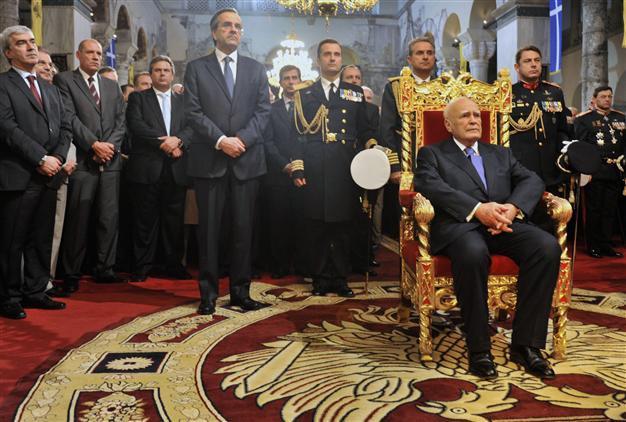Greece commemorates Balkan Wars, Thessaloniki restoration
THESSALONIKI, Greece - - Agence France-Presse

Greek President Karolos Papoulias sits in the center of Saint Dimitrios church to attend a religious ceremony marking the 100-year liberation anniversary of Thessaloniki, with the Greek Prime Minister Antonis Samaras (front L) and other dignitaries in the northern Greek town of Thessaloniki October 26, 2012. REUTERS Photo
Greece today opened a three-day celebration to commemorate the victorious Balkan Wars of 1912-1913 that restored the city of Thessaloniki to Greek control after nearly five centuries of Ottoman rule.
The celebration featuring a special museum exhibit, a military parade and a mounted procession of troops in historic period uniforms was inaugurated by President Carolos Papoulias and Prime Minister Antonis Samaras.
"We would prefer to celebrate the centennial of this liberation under very different circumstances, not at the heart of a crisis," Samaras said.
"But the lessons of this period may be more pertinent and stronger today... serving to understand the great strength we have inside us, and as a nation," the PM said.
Papoulias, a former resistance fighter in World War II, said that the Greek people "can never be beaten." The flag raised on October 29, 1912 over Thessaloniki will lead the procession of mounted troops on Saturday that will follow the route through the city streets taken by the Greek army a century ago.
A military parade will close the celebration on Sunday, a national holiday in Greece that commemorates the country's resistance to the Axis powers.
The museum exhibition includes the original treaty of the city's surrender, written in French and only recently rediscovered in Greek army archives.
Fighting on the side of Bulgaria, Serbia and Montenegro, Greece retook Thessaloniki from the Ottoman Empire early in the conflict which eventually saw the small Greek state nearly double its territory.
The Bulgarian army, which was also keen to take the cosmopolitan Aegean port city, arrived a day later.
Friction between the Balkan allies led to the outbreak of the Second Balkan War in June 1913 in which Greece won further territory from Bulgaria.
Overall, the Greek state retook the regions of Thessaly, Macedonia and Epirus which had been lost to the Greeks since the fall of the Byzantine Empire.
